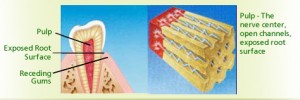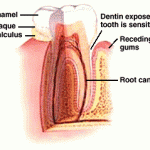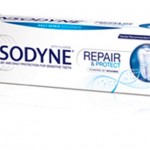Tooth sensitivity is often caused by the exposure of dentin on root areas due to receded gums or periodontal disease. Normally, the underlying dentin of the tooth (the layer that immediately surrounds the nerve) is covered by enamel in your tooth’s crown, and the gums that surround the tooth. This enamel covering may wear down over time, becoming thinner and providing less protection. Your gums can also recede over time, exposing the underlying root surface dentin. The dentin contains a large numbers of pores or tubes that run from the outside of the tooth to the nerve in the center. When the dentin is exposed, these tubes can be stimulated by changes in temperature or certain foods.
 One or more teeth can become sensitive to even slight pressure if it has been “bruised” or otherwise traumatized — by your accidentally biting down on a popcorn kernel, for example. Often, teeth feel sensitive after they’ve been cleaned, filled, or otherwise worked on at the dentist’s office.
One or more teeth can become sensitive to even slight pressure if it has been “bruised” or otherwise traumatized — by your accidentally biting down on a popcorn kernel, for example. Often, teeth feel sensitive after they’ve been cleaned, filled, or otherwise worked on at the dentist’s office.
Sometimes this kind of sensitivity can take weeks or even months to go away. In other cases, people can cause tooth sensitivity by habitually grinding their teeth or clamping their jaws tightly shut. This type of sensitivity to pressure isn’t something to worry about if it happens once or twice and goes away in a day or two. The tooth or teeth simply need time to recover from the trauma. It’s when the pressure sensitivity is persistent that you should suspect something like a break, crack, or decayed tooth and should see your dentist.
How Can You Tell if You Have Tooth Sensitivity?
 If hot, cold, sweet or very acidic foods and drinks, or breathing in cold air, makes your teeth or a tooth sensitive or painful, then you have sensitive teeth. Tooth sensitivity is a very common problem. It is estimated that approximately 25% of adults experience tooth sensitivity. Tooth sensitivity can come and go over time.
If hot, cold, sweet or very acidic foods and drinks, or breathing in cold air, makes your teeth or a tooth sensitive or painful, then you have sensitive teeth. Tooth sensitivity is a very common problem. It is estimated that approximately 25% of adults experience tooth sensitivity. Tooth sensitivity can come and go over time.
What Can You Do if You Have Sensitive Teeth?
First tell your dentist or hygienist. He or she can help you determine the best form of treatment to suit your needs.
Your dentist may prescribe a brush-on fluoride gel or a fluoride rinse. Fluoride rinses, available even without a prescription at your local pharmacy or in the dental section of grocery stores, can help decrease sensitivity, especially for people plagued with decay problems. Use it once a day. Swish it around in your mouth, then spit it out.
Sometimes, people with sensitive teeth need a stronger fluoride rinse or gel than the ones available over the counter. For example, some treatments for gum disease, such as root planing (which reduces plaque), can leave sensitive teeth even more sensitive than usual. In such situations, dentists can apply a fluoride gel that helps relieve the problem.
Keeping a good balance of minerals in the mouth will also help in the fight against sensitive teeth. The teeth undergo two processes; one is called demineralization and the other remineralization. Demineralization is where nutrients are removed from the tooth and remineralization is of course when they are replaced. As long as minerals are replaced faster that they are taken away, the enamel on the outer layer of the tooth will not wear down. Tooth decay will not happen as well as sensitive teeth.
Remineralizing the teeth can be done in a variety of ways. One of the first things that you can do is use a tooth paste that does the job for you. Several of the top brands contain minerals to aid in this process. Your dentist can also recommend several specialist tooth pastes designed for this purpose.
This comes as a surprise to many but chewing sugarless gum can help remineralize the teeth. The act of chewing forced the mouth to increase the saliva flow. This of course helps to clean the teeth but it also helps to replace many of the essential minerals that are lost. Dentist can recommend dental gums but any sugarless gum should do the trick. Saliva flow can also be increases by eating food high in fiber. If gum chewing isn’t for you, try eating strawberries or brown bread. This will have a similar effect as well as other health benefits.
You can also try using toothpaste specially made for sensitive teeth. Try putting some of the toothpaste on your finger or on a cotton swab and spreading it over the sensitive spots before you go to bed. Spit, but don’t rinse. Within a few weeks, your teeth should begin to feel less sensitive.
Use a soft toothbrush. Often, people actually cause tooth sensitivity by brushing with too much force and/or brushing with a hard-bristled brush, which can damage the protective tooth enamel. When the gum-line recedes (often as a natural part of the aging process), exposed dentin becomes even more vulnerable to toothbrush abrasion. Use a brush with the softest bristles you can find, and apply only a small amount of pressure when brushing (actually, a lighter touch also allows the bristles to move more freely and do their job more effectively than when you press too hard). Always ask your dentist or hygienist about the best way to treat your teeth’s sensitivity.
